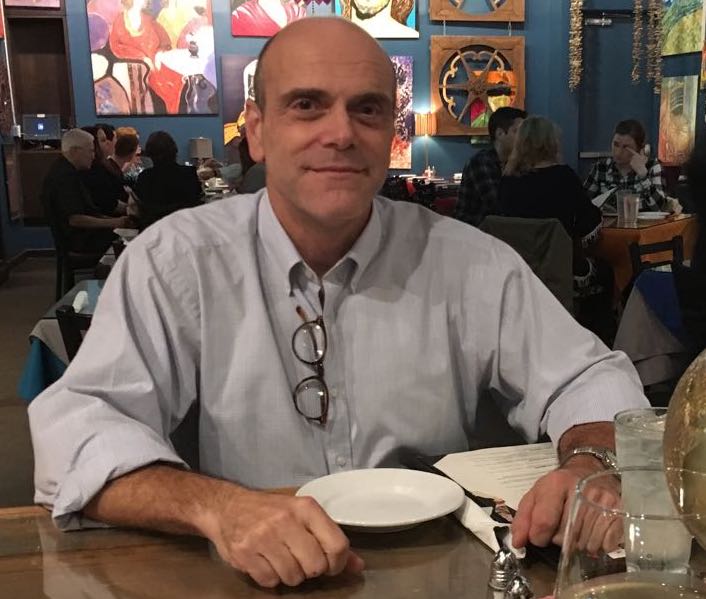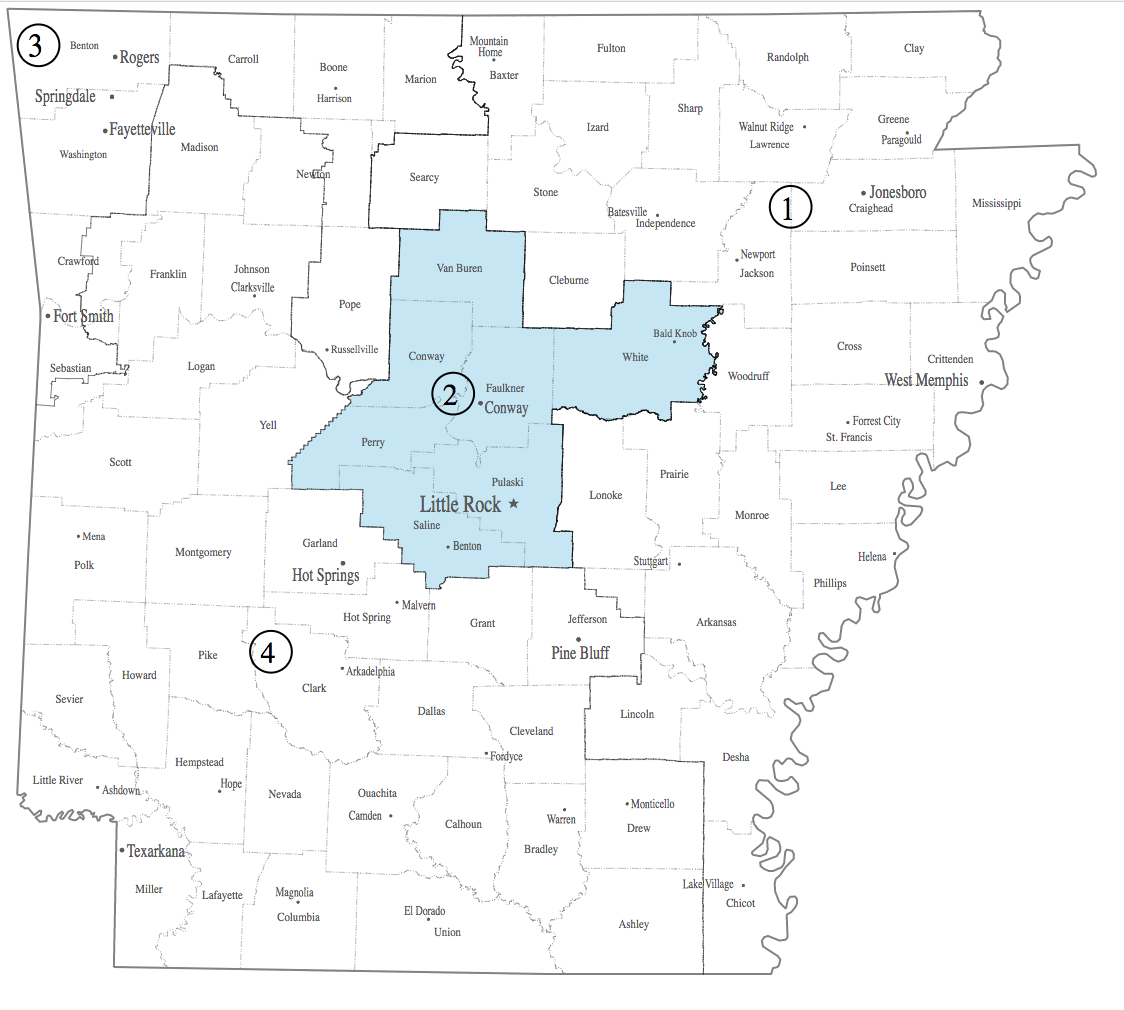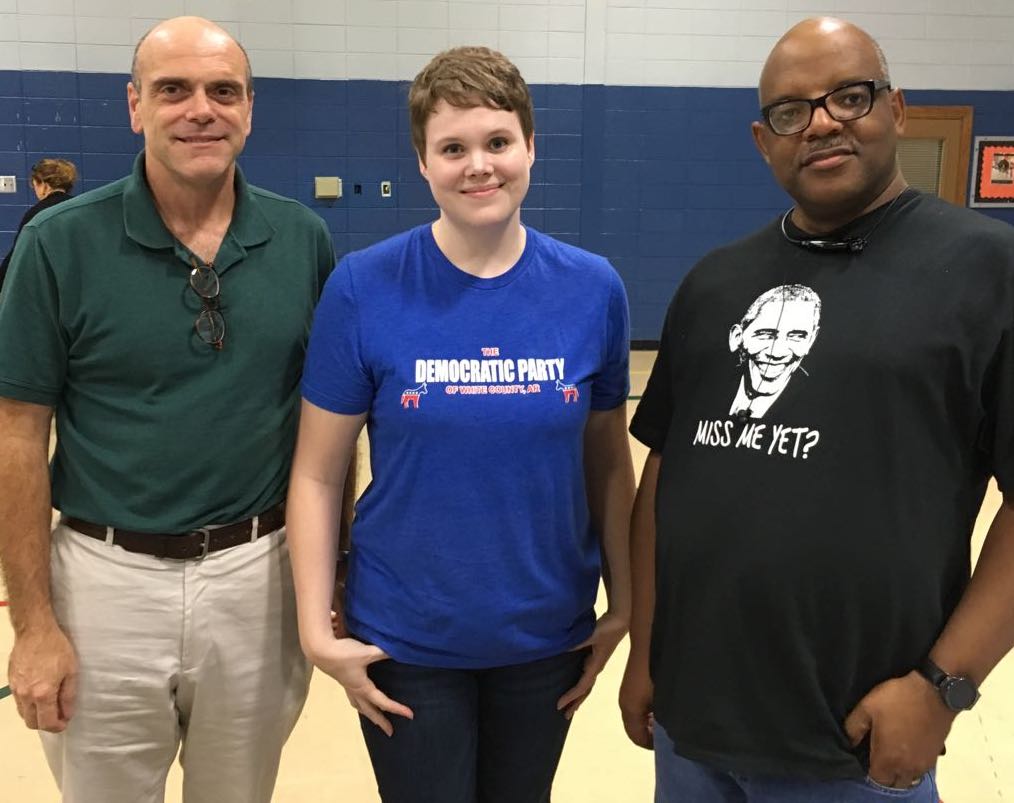On November 18th, I visited and spoke with Paul Spencer, who is running for Congress in Arkansas’s second district. A transcript of our conversation is below.
If after reading this interview you agree with me that Paul is the right candidate for the second district, please join me in donating generously to his campaign!
—Maciej Ceglowski
An Interview With Paul Spencer, Candidate For Congress in AR-2

Can you describe your district, for people who have never been to Arkansas?
It's a centralized district, unlike the other districts in the state which are far-flung. We’re lucky we have a compact district of seven counties. There are six rural counties and one urban county, Pualski County, which encompasses the capital of Arkansas, Little Rock.

That urban component of having Pulaski County in the district gives us a solidly Democratic county at the center of the rural counties. However, the rural counties are very red, very Republican. The second district is a fairly poor district; the whole state is the second poorest in the Union.
The median income in the second district is right around $40,000. Our make up is about 78% Caucasian in the district, about 19% African-American and 2% Hispanic. In Pulaski county, we have a much higher ratio of African-Americans to Caucasians. The strategy for taking the district is going to have to be bifurcated. The urban part, Pulaski county, we don’t want to take anything for granted, but it's going to go Democratic very heavily. There are, however, a lot of folks that do not regularly vote in Pulaski. That typically is a big part of our African-American community. Unfortunately, a lot of our Hispanic community is intimidated by the repressive voter ID laws and so forth.
And Little Rock is a segregated city
Little Rock is unfortunately very segregated still. Even though we had the 101st Airborne down here in 1957-58 to integrate Central High School, what we ended up with after that was white flight. The city fathers at one point decided to connect the eastern part of the city with the western part which was being developed at the time, so they in essence dug a moat between the east and west, I-630, which controlled access from the black parts of Little Rock to the white parts of Little Rock.
With regard to communities of color, we have a very aggressive voter registration program under way right now. We have members of our staff that are from those communities. So we are going for a very organic interaction with those groups.
I want to say one thing here. When I was growing up back in my hometown we grew out quite poor. We were an Italian majority-minority. The earlier waves of immigration, the Irish and the Germans, looked down on the Italians that came. We were kind of in the Italian ghetto, we shared that with the African-American community.
I can remember folks from outside that community coming in and they acted as though they had the answer to fix us, and that we were defective for some reason. I always resented that. When I decided to run, that was burned in the back of my mind, how these outsiders came in and had the remedy for everything that us poor Italians were prone to.
I'm trying to be careful to be respectful with these communities. I want to represent these people—I don't want to alienate them. I don't want them to feel as though here I'm the cure, the answer they’ve been waiting for. There's a much greater answer than this guy here. We’re careful to handle those folks respectfully, and treat them as our equals because they certainly are.
Unfortunately in Arkansas that's not always been the case. And it certainly doesn’t appear to be the case right now. That's our plan for the urban parts of the district.
One of the constant complaints that we’ve gotten as we network with folks in the rural areas is that they've never seen a Federal candidate come to their district. So we’ve deployed three to four members of our staff for each of the other six counties. They attend all the county meetings and interact with the community there and develop a very good rapport.
We're trying to spend more time in the rural counties. They might be R +68 in some of those counties, but our message is going to resonate not only with those folks who are Democrats, but I think it's going resonated with a lot of folks, because poverty, a lack of Internet, a lack of hospitals and a lack of health care health care isn't a Republican or Democratic issue, but affects all the folks in our state and all the folks in our district.
So we're giving those folks a lot of time and a lot of respect and making sure they feel like they're a part of this. This is not being done in a vacuum. We need the voters more than anybody else.
Ideologically, of course, running for the House of Representatives we want to be absolutely sure that these folks feel like they're being represented fairly and adequately.
You are one of the least power-hungry people I've ever met. What was the moment when you decided that despite some of your misgivings, you had to run for Congress?
There's a lot of reasons to not run, and I'm glad you noticed that I'm not all that power-hungry. I'll be 51 in a couple of weeks. I’ve taught high school seniors for 18 years. I see them as my sons. I have several thousand sons floating around Arkansas.
When you work with young people, and of course as a father of three boys, you end up loving other people's sons as though they were your own, and you always want to be as genuine with them and as truthful with them as you can. You don't want to tell them things that aren't true. I would never lie to them knowingly and I believe that they know that.
But as we talk about political philosophy and political science, the boys themselves notice there is a disconnect between what we learn about the Constitution about governance and our democracy, our republic, and what’s actually going on. And although I would love to be able to stand there and say "everything is going to be okay"—this is before Mr. Trump even won the Presidency. There were so many problems with campaign finance, lack of representation—that's a universal here in the United States.
So it was difficult for me to look them in the eye and say "just study your Constitution and vote be a good citizen and a good steward of your democracy, everything will be fine."
I had gotten involved in past particularly over the money in politics issue beginning around 2010 and I became a lot more jaded about that disconnect I mentioned earlier. It became harder for me to be so Pollyanna-ish with the boys.
At one point you just have to lead by example. I don't see myself as a particularly great role model for anybody, but at some point you have to put up or shut up.
When Mr. Trump won the Presidency, it was a culmination of me feeling inadequate to the task being a good role model and being inadequate as an educator to really give an answer to the things that were going on. With my own children and these guys that I just have the highest regard for, it was time to disrupt my life and I think in a positive way.
It's not like I'm a Spartan heroic figure. I don't think I'm doing anything that a lot of people wouldn't do. I'm not a martyr for a noble cause. As I get older and starting to look mortality in the face a little more, you have to be able to look at your children, your wife, the people that you teach, and you have to be able to look at yourself and ask yourself, did you do everything you could?
It saddens me in a way to do this because I'll miss a lot of my youngest son's childhood. But I think it's better for him in the long run to have a better, more functional republic.
I know that your students must believe in you, because a couple of your former students have come back to run your campaign. Your opponent is a rich banker. This will be his third election. You're in a district that's considered Republican leaning, at R+7. What's your plan for winning here and winning convincingly?
We decided when we went into this race that it was going to be a principled race, that it was going to be an ethical race, and that we were simply going to tell the truth. I believe on the most basic level if we go and show sincerity and just tell the truth about things that's going to be one of the biggest advantages we can have.
Of course we have a strategy about how to deal with the rural districts and the urban districts and so forth. But I think one of the shortcomings of Representative Hill is I don't believe he was being forthright with the people at the second District when he was elected. He took an oath of office.
I don't want to say anything horribly disparaging about Representative Hill, I've known him for a long time. But I don't believe his priorities are the people of the second District. And I think that one of our most basic goals, and I think the thing that will give us the greatest traction, is to show the people of the second district that we are going to advocate for them and we are going to represent them and we're not going to represent the Koch Brothers where or the NRA or the Club for Growth.
That's becoming very obvious to a lot of folks in Arkansas now, given the attempts to do away with healthcare and now these tax policies that are dribbling out of Washington.
He's probably doing a great deal for us. We don’t really have to go out of our way to stand as a alternative because we are just doing what anybody else does, whereas he's drawing significant distinctions between what any other candidate would behave and what they would be duty-bound to achieve for their constituents.
By his actions towards special interests I think that that's drawing a wonderful contrast between him and us. French Hill was going to outraise use probably at a ratio of 30:1, but we’re at a point now that money isn't the biggest obstacle to us becoming the next representative of the second District. I don't think we have a major obstacle.
Of course, if you look at it in dollars and cents and if the strategists from DC look at it they're going to say, "oh my goodness you're not going to have the money to do this."
Well, we've seen a lot of people dump a lot of money in elections. We had a race here a few years ago between Tom Cotton and Mark Pryor, a Senate race, that was the second most expensive race American history. The only one that cost more was the Mitch McConnell run. So we like to point out to a lot of the folks when you run the combined campaign in excess of $80 million, assuming that at least $40 million of that was spent on the Democratic side, they still lost the seat. it's not the money. It's the ideas behind it. It's the policy decisions.
Beginning in 2010, with the Citizens United ruling, we entered an era where money matters a great deal on a more visceral level. But I think at the end of the day it's going to be an important thing but it's not going to be overriding thing. People are going to win and lose elections by spending millions and millions of dollars. Just because you spent $40 million and win or you spend $40 million to lose doesn’t tell me there's huge paradigm with regards to the amount.
It is going to be—do people believe that you have their best interests at stake? I believe that contrasting what our plans are and what we believe is going to be that little boost that’s going to push us over.
There was a survey taken not long ago here in Arkansas that found 58% of the electorate that voted for the Republican incumbents would consider jumping over to the Democratic side. And only 38% of the folks who voted for the Republican incumbents are happy with their choice. That's very encouraging.
What can people in the tech community do to help you win?
On a very personal level, the fact that a tech worker is undertaking this type of challenge and going around and staying away from their family and loved ones to just travel the country and visit congressional candidates... I think that's an encouraging sign. A lot of times when you're running for office, particularly in a place like this, you tend to feel like you're in a bubble. You're not in it for the notoriety. Apparently, it's the worst job in politics, the House of Representatives. That people give a damn someplace else is greatly encouraging.
On a more pragmatic and utilitarian level, though we renounced the idea that money governs all politics, we can't look past the reality that it does cost a lot of money to run. We figure that we can make it through the primary on about $75,000 —that will be very comfortable for us—but after that it's going to ramp up exponentially.
For any tech person out there, firstly the cost of everything in Arkansas is much less than it is in Silicon Valley and the Bay Area. If you think that you can't give a lot, your 'little bit' by Bay Area standards goes a long way in Arkansas's second district.
We would like to be able to go into the May 22 primary keeping around $50-$60,000 I think that would be very sufficient. We're not stopping there. We would obviously like to have a great deal more than that.
For anybody who feel so moved to help any of the congressional candidates that you're looking at now, if they're in a position where they're financially comfortable in doing so, we here on the ground would certainly appreciate that.
What is going to be your key legislative priority on your first day in office—the issue you work on before anything else?
Having the past that I have, in advocating for ethics reform and disclosure of dark money and campaign finance reform, I've always said from the day I decided to run that on my first day in office I'm going to cosponsor an amendment to overturn Citizens United and this zeitgeist of unfettered campaign spending and money as speech.
My second act is going to be cosigning and cosponsoring Medicare for all. Of course there's thousands of things that need to be addressed, and we have a lot of things that we are looking at, but those are my biggest legislative priorities.
I'm not going to have to sit back with the Bureau of Legislative research and hammer these things out, these things have already been promulgated. And unfortunately I think we're a little ways off from having those things pass. But I just wanted to add my name first off because these are the things that really got me to where I am today. I wouldn't be running for Congress to work for healthcare if it wasn't for financial spending in elections. That was the catalyst that got me involved. I'm going to sign my name to those things and then get down to the people's business in a lot of different ways.
I think that here in Arkansas we need to really look at broadband—how can we make broadband accessible in rural areas where it's cost prohibitive for folks to bring it in, but not lucrative enough for the providers to treat it like a utility.
I never appreciated until I became an educator how important the Internet is. Having ready access to the outside world. There’s a definite link between that educational level and what you can achieve. If the children prosper, the state's going to prosper. If the children are in a rush to get out of the state because there's nothing here from them, the state's going to stay the second poorest in the country.
As much as I didn't want to acknowledge that, being an old-timey guy, it's absolutely necessary. It's like vaccines.
Thank you so much for talking to me!

Paul with the leadership of the Searcy Democratic Party in White County, Arkansas
Please share this interview with others, and take a moment to donate to Paul's campaign! The money you donate now will go directly into grassroots work including staffing, field offices, outreach, and canvassing. We can help Paul flip his district in 2018 if we give him adequate resources in 2017.
If you can afford it, please consider giving the maximum donation of $2,700. But any amount you can give will make a difference. Whatever the Democratic Party thinks, this is a district we should be fighting hard in!